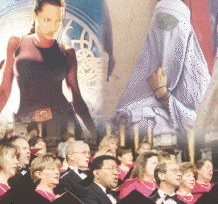 Last month, I discovered a “thinking error” of national “groupthink” proportions that frustrates defeating terrorism and undermines peace negotiations around the world.
Last month, I discovered a “thinking error” of national “groupthink” proportions that frustrates defeating terrorism and undermines peace negotiations around the world.
“Thinking errors” are logical fallacies that affect self-image and behavior. The idea, “I am nothing but a worthless loser,” is an example. Thinking errors come in dozens of varieties that are identified and treated in the domain of cognitive behavioral psychology. They can be responsible for everything from minor depression to suicide and killing sprees.
The social psychologist Irving Janis described and popularized the concept of “groupthink” in 1972. It often results in disastrous decisions when otherwise intelligent people elevate consensus above critical thinking and moral judgment. In 1982, he noted that the Watergate cover-up by the Nixon White House was a good example of “groupthink”.
 I discovered this “thinking error” of “groupthink” proportions at the Air Force Academy. The class discussion was polite. Around five cadets were calling themselves non-religious. The other forty or so claimed to be religious. When asked why they were non-religious, the minority said that it was because all religions are basically the same with none demonstrably truer than another. No one contradicted this claim. No one had the courage to assert that religions were different or that one was better. Instead, the majority talked about how their religious practices, whether Catholic, Protestant, or Jewish, were personally meaningful to them.
I discovered this “thinking error” of “groupthink” proportions at the Air Force Academy. The class discussion was polite. Around five cadets were calling themselves non-religious. The other forty or so claimed to be religious. When asked why they were non-religious, the minority said that it was because all religions are basically the same with none demonstrably truer than another. No one contradicted this claim. No one had the courage to assert that religions were different or that one was better. Instead, the majority talked about how their religious practices, whether Catholic, Protestant, or Jewish, were personally meaningful to them.
These students intuitively sensed that if all religions are basically the same, then religious distinctions are irrelevant. Rather than challenge the proposition, they resorted to demonstrating how religion was personally relevant to them. It’s a good existential argument. It facilitates harmony when religious differences are relevant personally but not publicly. However, it will not work when religious differences have profound public impact. It’s one thing to have interfaith harmony when differences are inconsequential, as they might be at the Air Force Academy or even in America. It’s quite another to have peace when the differences have public consequences.
 In the article “Separate Truths” published on 25 April 2010 in the Boston Globe at Boston.com, Stephen Prothero calls “this view that resounds in the echo chamber of popular culture” odd and intriguing. He notes, “No one argues that different economic systems or political systems are one and the same.” Throughout his article, he calls this concept “untrue,” “disrespectful,” “dangerous,” “false,” “condescending,” and “a threat.” He writes, “How can we make sense of the ongoing conflict in Kashmir if we pretend that Hinduism and Islam are one and the same? Or of the impasse in the Middle East, if we pretend that there are no fundamental disagreements between Judaism, Christianity, and Islam?”
In the article “Separate Truths” published on 25 April 2010 in the Boston Globe at Boston.com, Stephen Prothero calls “this view that resounds in the echo chamber of popular culture” odd and intriguing. He notes, “No one argues that different economic systems or political systems are one and the same.” Throughout his article, he calls this concept “untrue,” “disrespectful,” “dangerous,” “false,” “condescending,” and “a threat.” He writes, “How can we make sense of the ongoing conflict in Kashmir if we pretend that Hinduism and Islam are one and the same? Or of the impasse in the Middle East, if we pretend that there are no fundamental disagreements between Judaism, Christianity, and Islam?”
Only about fifteen percent of American population calls itself non-religious, but nearly one hundred percent of news reporters and policy makers are in this “groupthink” echo chamber. They are conveniently ignoring at least three ways that Muslim and Judeo-Christian religious differences have consequences in the public arena. Without addressing these differences, there will be no hope for peace in the Middle East and little chance to stem the growth of homegrown attacks from the likes of the Fort Hood shooter. These three differences are: 1) equality before the law between men and women; 2) freedom of expression; and 3) freedom of conscience.
 Yes, it is true that the vast majority of Muslims disapprove of acts of terror in the name of Islam and favor peaceful means to advance their religious views, but it is also true that the vast majority of Muslims disapprove of what they consider to be immodesty, blasphemy, and apostasy. As most Americans readily support war to preserve political, economic, and religious freedom, most Muslims will similarly defend against what they consider to be challenges to the place of women and the honor of Islam. If Judeo-Christian civilization refuses to recognize these religious differences so that it can resolve them diplomatically, then it will continue suffering the consequences of violence from unaddressed differences and unwillingness to negotiate.
Yes, it is true that the vast majority of Muslims disapprove of acts of terror in the name of Islam and favor peaceful means to advance their religious views, but it is also true that the vast majority of Muslims disapprove of what they consider to be immodesty, blasphemy, and apostasy. As most Americans readily support war to preserve political, economic, and religious freedom, most Muslims will similarly defend against what they consider to be challenges to the place of women and the honor of Islam. If Judeo-Christian civilization refuses to recognize these religious differences so that it can resolve them diplomatically, then it will continue suffering the consequences of violence from unaddressed differences and unwillingness to negotiate.







 Act Beyond
Act Beyond http://www.faithandwar.org
http://www.faithandwar.org Mark Durie's Blog
Mark Durie's Blog Military Missions Network
Military Missions Network The Christian Fighter Pilot
The Christian Fighter Pilot The Navy Christian
The Navy Christian